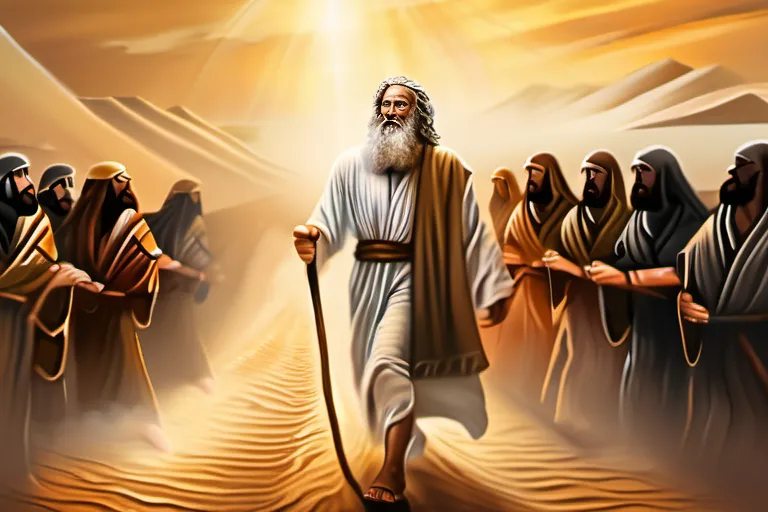Explore the profound impact and symbolic meaning of the Exodus story on Jewish history, culture, and faith.
Delve into the heart of Judaism as we uncover the significance of the Exodus story. From its origins to its enduring influence, this tale of liberation has shaped Jewish identity for millennia.
The Origins of the Exodus Story
The origins of the Exodus story are shrouded in time, blending mythology and history into a narrative that has shaped Jewish identity for millennia. How did this tale come to be? Was it purely an oral tradition, or does it have roots in actual historical events?
The story of the Exodus, as we know it today, finds its earliest recorded form in the Hebrew Bible, specifically in the book of Genesis. Yet many scholars believe that much of what is written in these early texts was built upon earlier oral traditions and stories passed down through generations. This raises a fascinating question: How did this story evolve from simple folktales into a central pillar of Jewish tradition?
The historical context offers intriguing clues. The Israelites, as they are referred to, lived under the harsh rule of Egypt for many years before their liberation. Could the Exodus story have been an allegory for this period of subjugation? Some scholars argue that the narrative may contain elements from various periods of ancient Near Eastern history, suggesting a complex interplay between fact and fiction.
The oral traditions surrounding the Exodus likely began to take shape during the Babylonian exile in the 6th century BCE. The period of enforced separation and cultural assimilation may have catalyzed the formation of these stories as a means of preserving identity and hope for deliverance.
The combination of historical events, oral traditions, and deliberate storytelling in later centuries has created a rich tapestry of meanings surrounding the Exodus. It serves not only as a historical account but also as a spiritual journey, a metaphorical guide through trials and tribulations. How does this ancient narrative continue to resonate with modern Jews? And what can we learn from its enduring power?
The origins of the Exodus story are more than just academic curiosity; they are a living legacy that continues to shape Jewish culture, faith, and identity. As we delve deeper into this intricate narrative, one cannot help but wonder: What does the Exodus tell us about our own journeys today?
The Exodus Story in the Hebrew Bible
The Exodus story, as it unfolds in the Book of Exodus, serves as a cornerstone of Jewish tradition and faith. How could this narrative, filled with dramatic moments and profound symbolism, fail to resonate deeply within the heart of every Jew? The structure of the Exodus tale, with its clear divisions into distinct phases—freedom from slavery, journey through the wilderness, and receipt of the Torah—is like a blueprint for spiritual growth. Each phase carries its own lessons, challenges, and revelations.
The themes woven throughout the narrative are as rich as they are complex. Freedom is not just about escaping physical bondage; it’s about liberating oneself from the chains of ignorance and apathy. The Pharaoh, with his stubborn resistance to Moses’ demands, becomes a metaphor for oppressive systems, challenging readers to question authority and fight against injustice. The parted Red Sea can be seen as a symbol of divine intervention and deliverance, reminding us that sometimes we need the supernatural to break through our own barriers.
The literary style of the Exodus narrative is equally compelling. Moses’ confrontations with God are not just theological debates but dialogues between man and his maker, filled with intense emotions. The dramatic narratives, from the plagues on Egypt to the miraculous crossing of the Red Sea, are told in vivid detail, creating a sensory experience that engages the reader. The use of repetition—such as the refrain ‘Let my people go’—serves not only to emphasize the urgency but also to create a rhythmical, almost musical quality that underscores the narrative’s themes.
By delving into the structure, themes, and literary style of the Exodus story, we can better appreciate its profound impact on Jewish history, culture, and faith. It is more than just a historical account; it’s a living, breathing tale that continues to inspire and challenge generations of Jews worldwide. How can such an ancient narrative still hold such relevance in today’s world?
The Exodus Story: A Symbol of Liberation
The Exodus story is more than just a series of events that took place millennia ago; it’s a metaphor that has shaped Jewish identity and faith for generations. How many times have we wondered, ‘What does freedom truly mean?’ The Israelites’ journey out of Egypt serves as a powerful reminder that true liberation comes not just from breaking chains but from cultivating the spirit. This story is more than a tale of escape; it’s a blueprint for understanding our own struggles and triumphs.
Imagine, if you will, a nation that had been in bondage for centuries. Their lives were a stark contrast to the promise of freedom, where they could thrive and flourish. The Exodus narrative teaches us about resilience and perseverance, showing how a people can rise up against oppression with faith and hope. It’s like finding a light in the darkest tunnel, guiding them towards a better future.
The symbolism of crossing the Red Sea is profound. Just as the Israelites were saved from their oppressors, we too face challenges that seem insurmountable at times. Yet, with courage and belief, we can overcome any obstacle. This event serves as a metaphor for spiritual rebirth, where one emerges not only free but renewed and purified.
The Exodus story also underscores the importance of community and unity. The Israelites were united in their struggle, supporting each other through trials and triumphs. It reminds us that we are stronger together than we are alone, a lesson that resonates deeply within Jewish culture and faith.
In essence, the Exodus is not just about leaving Egypt; it’s about finding the strength to leave behind the constraints of our own lives, whether they be physical or metaphorical chains. It’s a call to action for all who seek liberation—to break free from the shackles that hold us back and embrace the promise of freedom.
So, as we reflect on this timeless narrative, let us consider our own paths and the challenges we face. The Exodus story is a testament to hope, reminding us that no matter how dark the present may seem, there is always light at the end of the tunnel if we hold onto faith and persevere.
The Exodus Story in Jewish History
The Exodus story has been a guiding light for countless Jewish figures and movements throughout history, serving as both a historical narrative and a spiritual beacon. How many times have we heard of great leaders drawing inspiration from Moses’ bravery and resilience? From ancient rabbis to modern activists, the tale of liberation continues to shape the course of Jewish life.
Moses himself can be seen as a prototype for future saviors in Jewish history. Just like how Moses led the Israelites out of slavery with divine guidance, many have taken up this mantle over time. Think about it—could you imagine the Maccabees’ revolt without the inspiration from the Exodus? Their struggle against oppression was undeniably influenced by the tale of Jewish freedom.
The Exodus story also played a pivotal role in shaping significant events such as the founding of the State of Israel. The narrative of returning to one’s homeland after centuries of exile resonated deeply with those who were dreaming of creating a modern nation. Leaders like David Ben-Gurion often cited the Exodus when advocating for Jewish independence, emphasizing the historical and spiritual legitimacy of their cause.
Moreover, the themes of freedom and perseverance found in the Exodus have inspired countless individuals and movements within Judaism. Take the American Jewish community during its early struggles; the story of the Israelites facing adversity but ultimately emerging victorious provided a powerful metaphor for their own journey towards acceptance and equality.
In essence, the influence of the Exodus on key events, figures, and movements in Jewish history is profound. It serves as a constant reminder of the power of faith, perseverance, and the pursuit of freedom. Every time we reflect on this story, we are reminded that our past is not just history—it is a living narrative that continues to guide us today.
The Exodus Story in Jewish Culture
The Exodus story continues to shape Jewish culture, traditions, and holidays like an invisible thread weaving through the fabric of our daily lives. How many times have you participated in Passover seders, reciting the Haggadah, and singing songs that celebrate freedom from slavery? Is it just a tradition or does it hold deeper meaning?
When we gather around the seder table, we do more than just remember our ancestors’ journey; we re-enact their struggle for liberation. The matzoh we eat is a symbol of the unleavened bread our forefathers ate as they fled Egypt in haste. Is it any wonder that this simple food becomes a powerful reminder of resilience and hope?
Moreover, the Exodus story influences our daily lives beyond the holiday season. It teaches us about the importance of standing up for what is right, even when it seems like no one else will. When we face challenges or find ourselves in difficult situations, isn’t the Exodus a metaphorical journey we can draw upon? Can we not see our own lives as a series of steps out of bondage towards freedom?
The Passover story is also deeply intertwined with social justice and the fight against oppression. From the plight of Moses, who championed the rights of his people, to contemporary struggles for equality and human rights, the lessons learned from the Exodus are timeless. Are we not called upon to be agents of change in our communities?
So, as you reflect on the Exodus story this year during Passover, consider how it resonates with your own experiences and aspirations. How can you apply its message of freedom and justice to your life? The Exodus is not just a historical event; it is a continuous narrative that defines our identity and guides us through the complexities of modern life.
In this way, the Exodus story remains relevant, a beacon of hope and resilience that illuminates the path forward. Will you embrace its lessons and carry them into your future?
The Exodus Story: A Foundation of Jewish Identity
Imagine if you will, a story that has been passed down through generations, woven into the very fabric of Jewish identity and self-understanding—a narrative so profound it shapes not only who we are but how we perceive our place in history and the world. This is the significance of the Exodus story in Judaism.
How can one not see the Exodus as a metaphor for freedom itself? Just like the Israelites were freed from slavery, so too do Jews find their liberation through understanding and practicing their faith. It’s a tale of courage and perseverance, a journey out of oppression into a land of promise.
The Exodus story is more than just an historical event; it serves as a continuous reminder of the struggle against injustice and the importance of standing up for one’s rights. Every Passover Seder is not merely a celebration but a reenactment of this journey, ensuring that the memory of slavery and freedom remains fresh in our minds.
Think about it: how does the Exodus shape your understanding of what it means to be free? Is it just physical liberation from chains or something deeper, like spiritual emancipation? This narrative goes beyond the physical escape; it’s about breaking free from the shackles of fear and doubt.
The Exodus story also highlights the importance of community. The Israelites journeyed together through the wilderness, facing challenges that tested their unity. In this way, the story teaches us the value of supporting one another in difficult times—lessons that resonate well beyond religious practice into everyday life.
As we delve deeper into the Exodus story, we see it as a foundational element not just for Jewish culture but for the broader understanding of freedom and liberation. It’s a tale that speaks to every human who has ever longed for escape from their circumstances. Through this narrative, Jews find their roots, their identities, and their purpose in life.
Conclusion
 Understand the profound impact of the Exodus story on Jewish beliefs and practices, and appreciate its role in shaping a rich and resilient culture.
Understand the profound impact of the Exodus story on Jewish beliefs and practices, and appreciate its role in shaping a rich and resilient culture.











